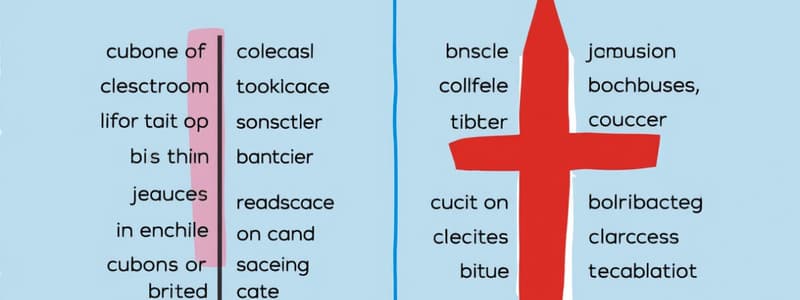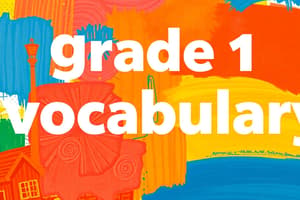Podcast
Questions and Answers
Which term is used in British English to refer to what Americans call 'sneakers'?
Which term is used in British English to refer to what Americans call 'sneakers'?
- loafers
- boots
- flip-flops
- trainers (correct)
What is the British English spelling of the American English word 'honor'?
What is the British English spelling of the American English word 'honor'?
- honor
- onour
- hounor
- honour (correct)
In American English, how is 'advertisement' typically pronounced compared to British English?
In American English, how is 'advertisement' typically pronounced compared to British English?
- no stress
- first syllable stress (correct)
- equal stress
- second syllable stress
Which term used in American English translates to 'flat' in British English?
Which term used in American English translates to 'flat' in British English?
What is the primary difference in pronunciation of the letter 't' between American and British English?
What is the primary difference in pronunciation of the letter 't' between American and British English?
Which of these words has a different spelling in British English with the '-ise' ending?
Which of these words has a different spelling in British English with the '-ise' ending?
What is the British English equivalent for the American term 'truck'?
What is the British English equivalent for the American term 'truck'?
Which word is commonly pronounced differently as 'cah' in British English?
Which word is commonly pronounced differently as 'cah' in British English?
What is the correct British spelling of the word that Americans spell as 'color'?
What is the correct British spelling of the word that Americans spell as 'color'?
Flashcards
Elevator (American English)
Elevator (American English)
In American English, this refers to a machine that transports people between floors.
Lift (British English)
Lift (British English)
In British English, this refers to a machine that transports people between floors.
Sweater (American English)
Sweater (American English)
In American English, this is a knitted or woven garment with long sleeves worn on the upper body.
Cookie (American English)
Cookie (American English)
Signup and view all the flashcards
-or (American English)
-or (American English)
Signup and view all the flashcards
-our (British English)
-our (British English)
Signup and view all the flashcards
Rhotacization
Rhotacization
Signup and view all the flashcards
T-glottalization
T-glottalization
Signup and view all the flashcards
Syllable Stress (AmEng)
Syllable Stress (AmEng)
Signup and view all the flashcards
Study Notes
Vocabulary Variations
- Everyday Items:
- American English: elevator, apartment, truck
- British English: lift, flat, lorry
- Clothing:
- American English: sweater, pants, sneakers
- British English: jumper, trousers, trainers
- Food:
- American English: cookie, fries, zucchini
- British English: biscuit, chips, courgette
- Transportation:
- American English: sidewalk, subway, truck
- British English: pavement, underground, lorry
Spelling Differences
- -or vs. -our:
- American English: color, honor, labor
- British English: colour, honour, labour
- -ize vs. -ise:
- American English: recognize, realize
- British English: recognise, realise
- -er vs. -re:
- American English: center, meter
- British English: centre, metre
- Double Consonants:
- American English: canceled, traveled
- British English: cancelled, travelled
Pronunciation Contrasts
- Vowel Sounds:
- American English often rhotacizes the "r" in words (e.g., "car" pronounced with a clear "r").
- British English may have non-rhotic accents where "r" is less pronounced (e.g., "car" sounds like "cah").
- Syllable Stress:
- American English typically stresses the first syllable in words like "advertisement."
- British English leans toward stressing the second syllable ("advertisement").
- T-glottalization:
- Common in British English, where "t" is softened or dropped in words like "bottle" (sounds like "bo'le").
- Less prevalent in American English, maintaining the "t" sound.
Vocabulary Variations
- Everyday items in American English differ significantly from British English, e.g., "elevator" (AE) vs. "lift" (BE).
- Clothing terms also show variation; "sweater" (AE) corresponds to "jumper" (BE), while "pants" (AE) are "trousers" (BE).
- Food terminology varies, with "cookie" (AE) being "biscuit" (BE) and "fries" (AE) referred to as "chips" (BE).
- In transportation vocabulary, "sidewalk" (AE) is known as "pavement" (BE), and "subway" (AE) translates to "underground" (BE).
Spelling Differences
- Spelling differences often involve the endings: "-or" in American English (e.g., "color") switches to "-our" in British English (e.g., "colour").
- Words ending in "-ize" in American English (e.g., "recognize") use "-ise" in British English (e.g., "recognise").
- American English typically opts for "-er" (e.g., "center"), contrasting with British English's "-re" (e.g., "centre").
- Double consonants vary; American English uses "canceled" and "traveled," while British English doubles the consonants to form "cancelled" and "travelled."
Pronunciation Contrasts
- American English rhotacizes the "r," leading to a pronounced "r" in words like "car," while British English may have non-rhotic accents that soften it (sounds like "cah").
- Syllable stress differs, with American English stressing the first syllable in "advertisement," whereas British English emphasizes the second syllable.
- T-glottalization is a feature in British English, where the "t" sound is softened (as in "bottle" sounding like "bo'le"), which is less common in American English.
Studying That Suits You
Use AI to generate personalized quizzes and flashcards to suit your learning preferences.




